Colin Muir Dorward
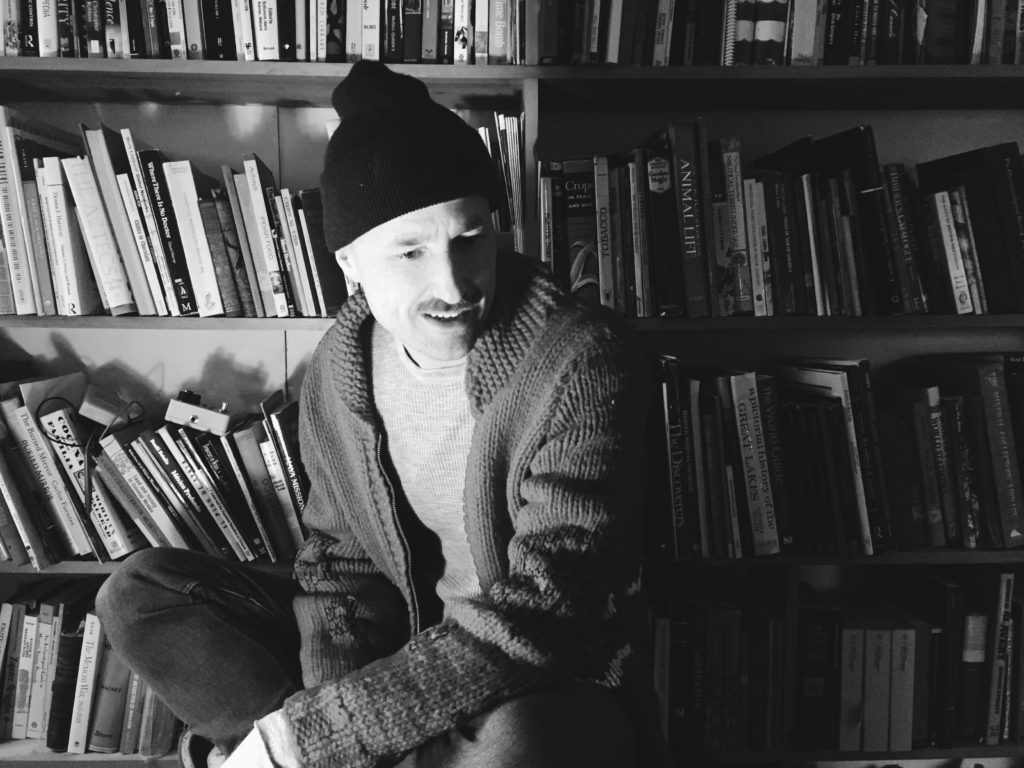
Colin Muir Dorward: fostexDubs Part One & Two
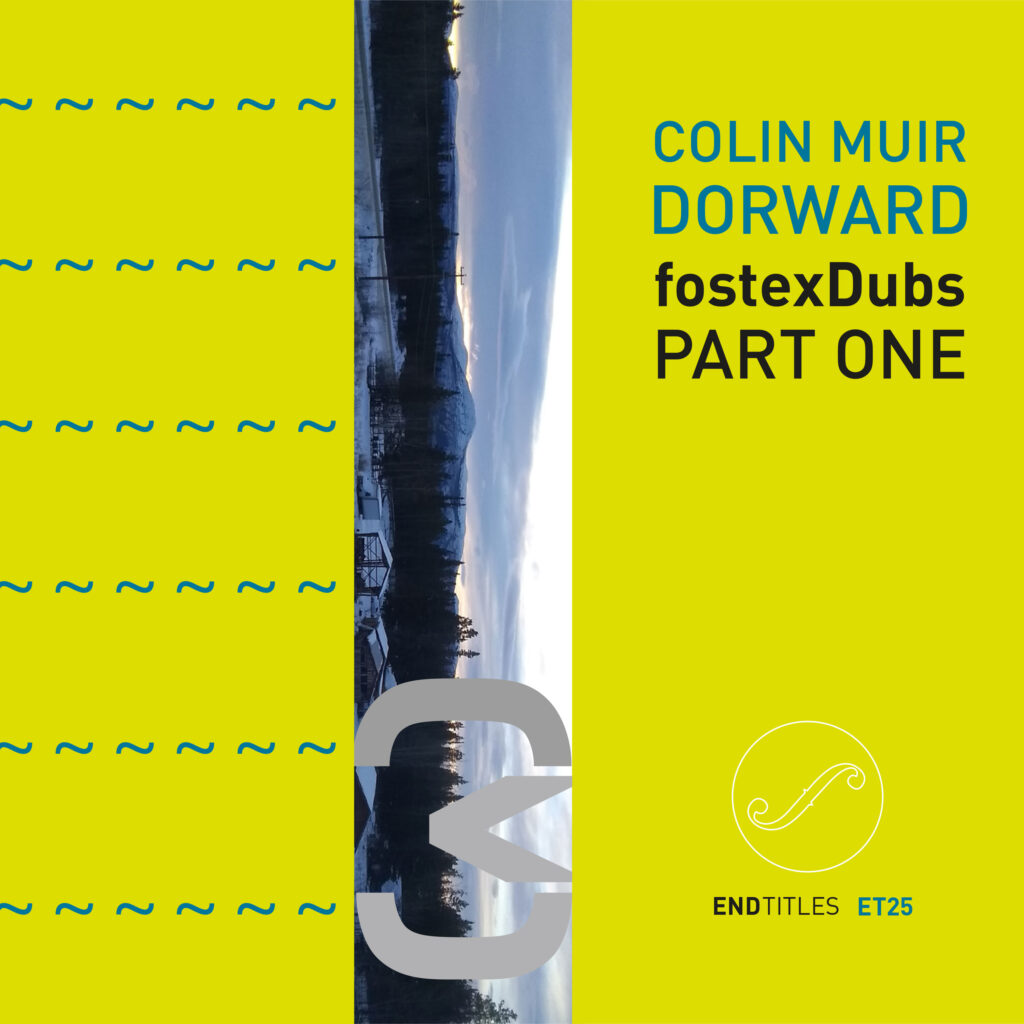
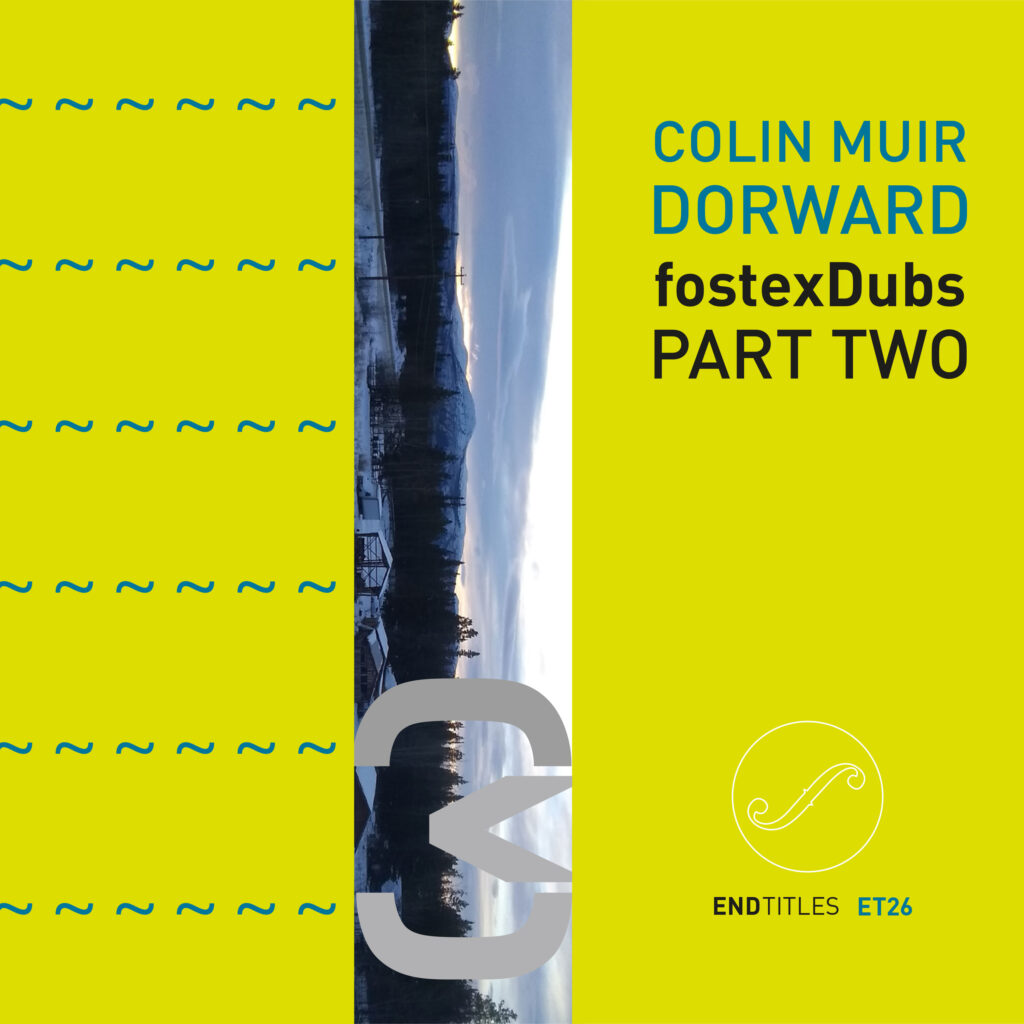
Colin is back!!!
These works were semi-improvised jams recorded by the fire. It was a very cold winter here in Yukon (CA), so I needed to set up a small station in a warm place. Most of the sounds and sequencing were done on an MC-909, but the Fostex mixer also felt like a main instrument. The setup included a few outboard FX, and eventually I added a keyboard. Recording was done directly to a two-channel Zoom thing. Enjoy fostexDubs Part One & Two!
Meeting the artist. An Interview.
ET: What is your new double album «fostexDubs Part 1 & 2» about? What was your instrumental approach for the album?
CMD: I don’t think there is a particular message in my music. Of course there are emotions, and making music is a way to express myself, but I don’t usually have an agenda when I record. If I had to name one driving force it would be curiosity. For this material, it was a fun challenge to make the mc909 not sound like a preset dance machine. With modern gear, it’s easy to become very critical of the engineers for making silly decisions because they should know better by now, but with older stuff, you kind of forgive them and move on. That mental shift of accepting what the tool is, warts and all, and finding out what it can do is a big part of my workflow.
ET: Tell us about your work as modular module designer? A new line to buy soon?
CMD: I got into synth DIY six or seven years ago and it stuck. I’m not an engineer but being a producer has definitely helped. This winter I finished designing a eurorack series I’m calling the Jade system. It’s a bread and butter thing with big, clear fonts, and easy to understand layouts. I wanted something suitable for live performance and also for beginners to learn subtractive synthesis. Despite the generic surface, everything has been designed to have a unique sound. There are lots of cool features and design choices under the hood to make it something of its own. I would love to say this will be available for purchase soon, but in reality what I need is for someone to help me with the entrepreneurial side of things. It’s very easy for me to drift away and lose interest when it comes to promotions, distribution, etc. For now I’m just plodding through and building up a small stock to sell locally.
ET: Tell us about your idea of building a residency for musicians? How is it going in the meantime?
CMD: Last summer we hosted a recording residency for local musicians. Seven artists/groups each got access to a recording studio for one week, and a small honorarium to basically do whatever they wanted. We drew names from a hat to choose who got the residency. This was volunteer run and organised, but we received a small grant from the Yukon government to pay the honorariums and a few other expenses. That project got iced once winter arrived because that space is not really insulated. This summer we plan to offer some new residencies and recording opportunities, but it’s too early to say what yet. There will definitely be a visual arts component added this year. I want to introduce an international residency, but for now that’s obviously on hold.
ET: Online concert series? What is the idea behind that?
CMD: fostexDubs evolved from some material I had prepared for a couple shows I did here in Yukon. I’d like to repeat that workflow and use some more live shows as an excuse to dive into a new setup and get some ideas working. Since online streaming events have become somewhat normalized, I figured it was a good opportunity to stage a tour, of sorts. I like that it’s kind of the opposite of what I imagined I’d be able to do since settling here a few years ago. The nearest metropolitan center is 2000kms away, so touring has not really been on my horizons.
ET: Thank you, Colin! Cheers!
Colin Muir Torwart: PHEVES
Colin Muir Dorward is a musician and painter living in Canada. He began producing as a teenager, spurred on by his brother’s burgeoning interest in computerized music technology. A brief education in programming and electronics gave Colin a formal background that was missing without music training. Producing since the 90s, he has thus drawn broadly from dancemusic, IDM, ambient. His compositions tend toward dense arrangements, perhaps influenced by his paintings, which are similarly complex. Colin has exhibited paintings across Canada, and is presently a PhD candidate in studio/visual art, where he paints large-format oils, and studies medieval painting. Next to his painting studio, Colin maintains a soldering lab, where he is developing a unique modular synthesizer format optimized for the DIY enthusiast.
EndTitles proudly presents his DIY synthesizer performance.
Meeting the artist. An Interview.
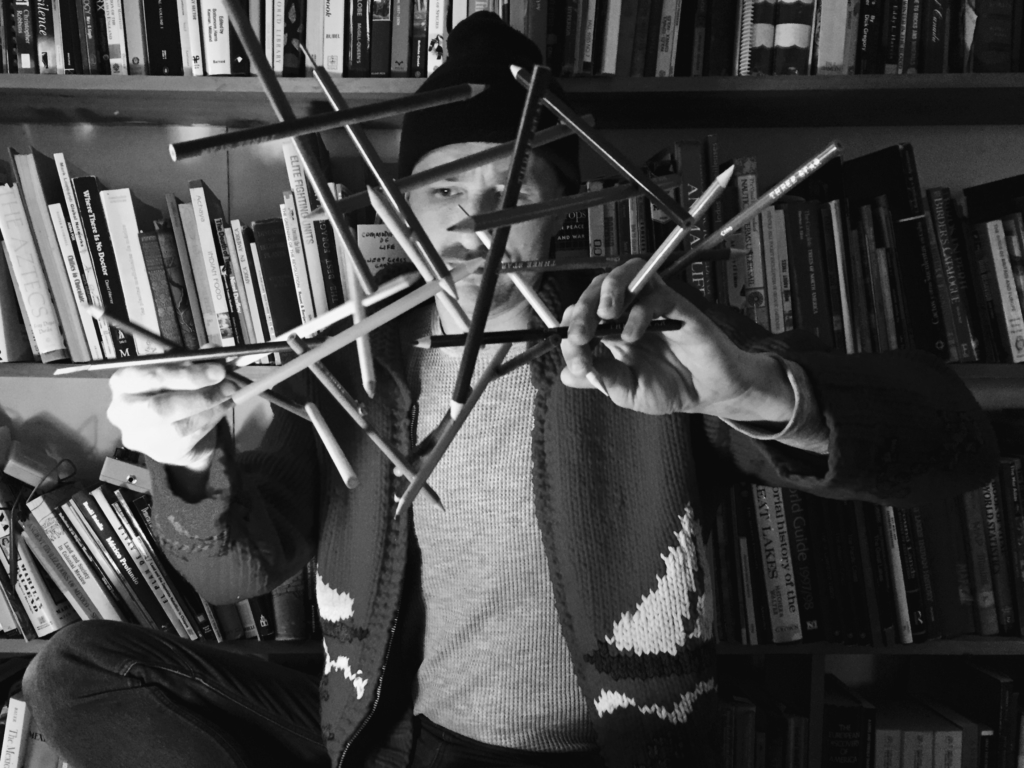
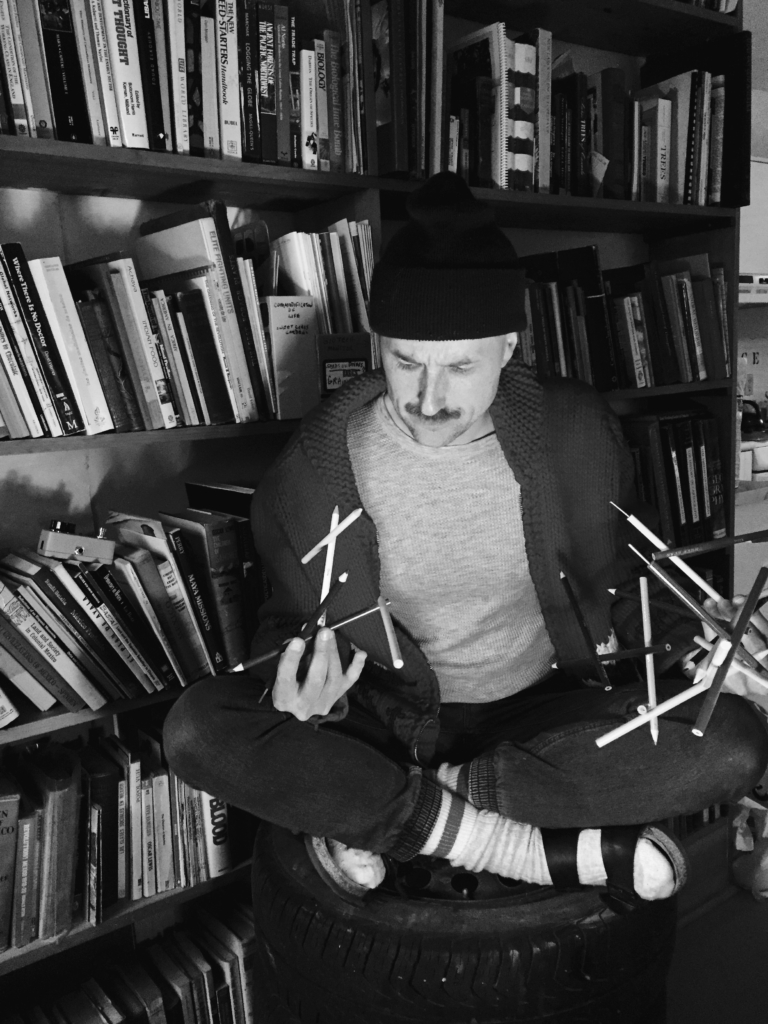
EndTitles met the artist for a quick online chat.
ET: Colin, you are a painter and musician. How do your works influence each other?
CMD: More than anything, music keeps me painting, it’s what drives me to pick up my brush and keep working. I couldn’t count the number of times I’ve been failing my way through a painting that is finally saved when some tune fills me with a wiked energy and gives me the confidence to find a novel solution. On the other hand, I think that painting has taught me to better understand my creativity. It showed me the benefits of seeing itas an engagement with my tools, rather than a process where I use tools to depict something that I hold in my mind. Not sure how clear that distinction is, but I guess at one point I thought that a composer/producer needed to have some kind of complete understanding of their compositions – like a perfect mental map of what was happening. Since I never had that map, I thought I had no potential. I think that painting taught me how to better get away from myself and accept that the tools have their own will. I suppose that once the track (or painting) is half-finished, it becomes the primary tool itself, and hopefully carries me away to some conclusion that I didn’t anticipate.
ET: What is your new album «PHEVES» about? What was your instrumental approach for the album?
CMD: The idea with most of these tracks was to try to make something interesting with as little as possible. At the beginning, it was by necessity, because I simply didn’t have much to work with. But even after I had collected a nice pile of gear, I kept making these minimal pieces with just one or two synths and some fx. Actually, it became a way that I acquaint myself with new gear.
ET: Tell us more about your idea of building a residency for musicians?
CMD: It’s premature to be promoting this, but talking about it is a good way to feel out the interest and get some ideas moving. My plan (fantasy?) is simple, I want to give musicians and sound artists a chance to work in a studio in the remote wilderness of Canada’s Yukon, where I typically spend my summers. I am presently building a small, semi-mobile studio/living space which I intend to fill with synths and recording gear, then park it out on a beautiful piece of land my father owns. Artists will need to make the long journey to the north, and accept the rustic living which is necessitated by the limited amenities.
ET: Best loved hardware vs. Best loved software?
CMD: Best loved HW and SW are whatever I’m using at the moment. I haven’t been using software much lately, but hope to get back to it one day. Yamaha v50 is probably my most-used older keyboard. AlphaJ sees lots of action, too. I have a few of the new, affordable analogs which are very good. I always wanted modulars, and had an Elektor for a short while ages ago, but had to sell it to pay rent. Euroracks exploded shortly thereafter, but honestly, they’ve always been beyond my budget, so I never had any. Instead, I decided to invest way more and develop my own modular format, which is slowly making its way off the work bench and into my music studio.
ET: Thank you, Colin.
Colin Muir Dorward is a musician and painter living in Canada. He began producing as a teenager, spurred on by his brother’s burgeoning interest in computerized music technology. A brief education in programming and electronics gave Colin a formal background that was missing without music training. Producing since the 90s, he has thus drawn broadly from dancemusic, IDM, ambient. His compositions tend toward dense arrangements, perhaps influenced by his paintings, which are similarly complex. Colin has exhibited paintings across Canada, and is presently a PhD candidate in studio/visual art, where he paints large-format oils, and studies medieval painting. Next to his painting studio, Colin maintains a soldering lab, where he is developing a unique modular synthesizer format optimized for the DIY enthusiast.
